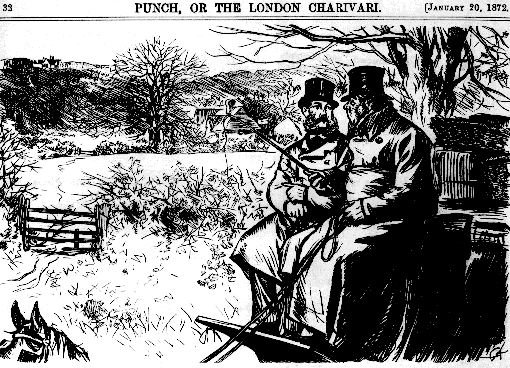
The Punch cartoon "A Misconception," which consists of a conversation between a driver and his passenger, illustrates Trollope's point about the way his contemporaries judge a person's greatness solely in terms of his material possessions and expenditure:
Passenger: "And whose house is that on the top the hill there?"
Driver of the "Red Lion" Bus: "O, that's Mr. Umberbrown's, Sir. He's what they call a R.A."
Passenger (Amateur Artist): "O, indeed! Ah! A magnificent painter! You must be rather proud of such a great man living amongst you down here!"
Driver: "Great man, Sir? Lor' bless yer, Sir, not a bit of it! Why, they only keeps one man-servant, and he don't sleep in the 'ouse ! ! !"
The driver measures the man's greatness, not by what he achieves, but by how many manservants he keeps, in the same way that the upper class disregards what Melmotte does. As the driver demonstrates, a person's worth in Victorian society has become a matter of the commodification of values and of reputation.
Although Melmotte does not have an aristocratic lineage, family estate, or even known sources of wealth, he quickly achieves enormous social power and almost manages to buy his way into the British upper class. When he throws a ball "on a scale so magnificent that it had been talked about ever since Parliament met" (I, 29), even a Prince attends. Later, when he hosts a party given in the honor of the Emperor of China, "tickets were being certainly ruling very high" (II, 88), and Lady Monogram makes a bargain with Georgiana Longestaffe "to chaperon Miss Longe.staffe at the entertainment, to take Miss Longestaffe as a visitor for three days, and to have one party at her own house during that time" (II, 88). On the night of the ball, even though Melmotte faces accusations of forgery and cheating, many still attend the ball, loyal to his money until the last moment. Despite being repulsed by Melmotte's personality and lack of a pedigree, people ultimately measure a man's greatness by his money.
Last modified 1996